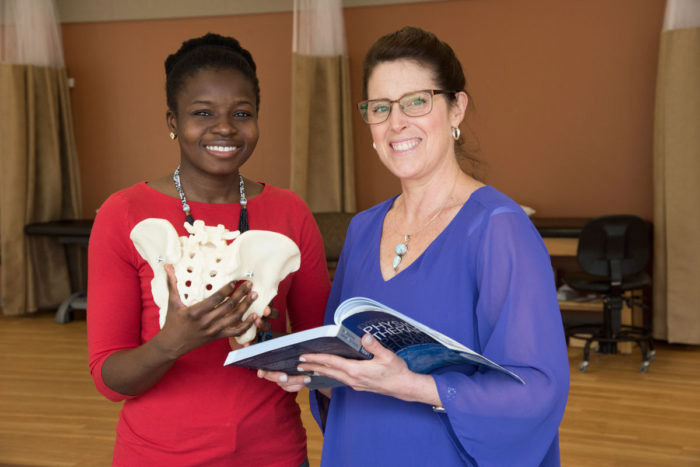Physical therapist plans to empower women and advance women’s health in Africa

Yewande Apatira, who will receive a doctorate in physical therapy in May, visits with her adviser and instructor, Tracy Spitznagle, associate professor of physical therapy and of obstetrics and gynecology. Photo by Robert Boston
Yewande Apatira grew up in Nigeria and knew from a young age she wanted to work in health care. When she eventually returns to her home country, she will do so as physical therapist specializing in women’s health care. It’s a role she never envisioned as a child — but one she feels certain was her calling.
Apatira, who will receive her doctorate in physical therapy this month, decided to explore the field while a student at the University of Ghana.
After graduating with honors, she found she loved the patient connection in physical therapy. But after practicing for two years, she decided she wanted to learn more.
Researching programs online, she found Washington University’s Program in Physical Therapy. After reviewing the curriculum, she decided St. Louis was where she wanted to be.
Apatira had planned to focus on providing care for people with neurological disorders. “I like to nurture people, and clients in neuro-rehab have very special needs,” she said.
But that changed for Apatira late in her course of study. During the spring 2015 semester, Tracy Spitznagle, associate professor of physical therapy and of obstetrics and gynecology, became her adviser on a project. Meanwhile, Apatira also was taking Spitznagle’s class on women’s health and realized the subject was something she wanted to explore further. After talking with Spitznagle about working to improve global health, and learning about needs and opportunities in Ethiopia and Niger, Apatira’s interest in women’s health grew even more.
“I’m a very spiritual person, and I felt like God was leading me down this path,” she said.
Spitznagle suggested Apatira take short, intensive course on women’s health. Apatira took her advice and then decided to switch her focus.
“Some of my classmates have asked, ‘Wait, when did you decide to do this?’” Apatira said with a laugh.
“Over the years, I have been increasingly involved in the spiritual and economic development of ladies in my church, and I want to broaden my scope,” she said. “Developing knowledge in women’s health physical therapy creates another avenue through which I can equip women.”
Spitznagle finds Apatira’s journey inspiring.
“Yewande first gave me goose bumps when, during the second year of her coursework, she told me she had a background in working with women in her home country of Nigeria,” Spitznagle said. “Through the following year, the conversations we had about women’s health on a local and global scale sometimes took my breath away, since for her, the global issues are so very real.”
In September, Apatira will begin a one-year clinical residency in women’s health, through the Program in Physical Therapy residency at the medical school. Currently, only one applicant is chosen for the residency each year. She then plans to take what she’s learned back to Nigeria.
Apatira explained that there is a high demand for women’s health specialists in Africa. There is limited access to routine women’s health care and physical therapy in the treatment of conditions of the pelvic floor and lymphedema, among others. She is committed to helping change the situation.
She envisions working with the National Postgraduate Physiotherapy College of Nigeria in its new women’s health specialty, perhaps teaching entry-level courses. She also plans to form collaborations with obstetricians, gynecologists, midwives, community health workers and general practitioners with the goal of serving low-income women in a women’s health outpatient clinic.
“My future plans include empowering women, committing myself to lifelong learning and mentorship, and contributing to advancing women’s and pelvic health in Africa,” Apatira said.
by Judy Martin Finch